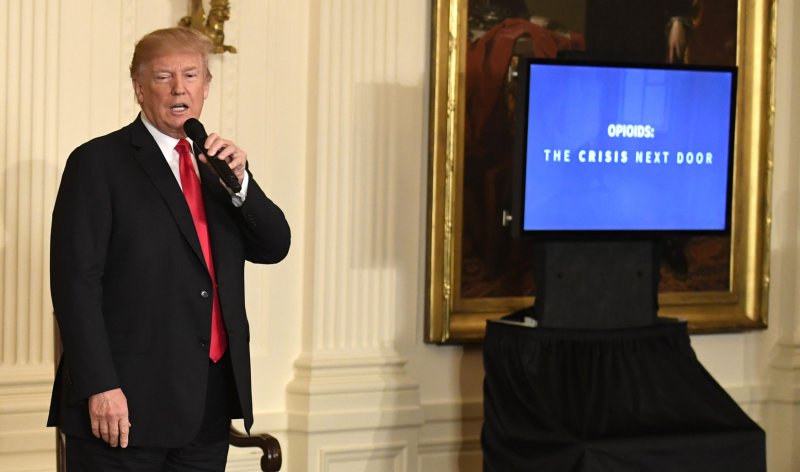1 of 4 | President Donald Trump makes remarks during a White House-hosted opioid summit Thursday in Washington, D.C. Photo by Mike Theiler/UPI |
License Photo
March 1 (UPI) -- President Donald Trump on Thursday called for stronger punishments for drug dealers to fight the nation's opioid crisis, pointing out that some nations use the "ultimate penalty" against those offenders.
While the president didn't outright advocate for the use of the death penalty for drug dealers, he compared the U.S. justice system to other countries where it is used.
"It's a problem that's growing. And drugs are a similar but different problem in the sense that we have pushers, and we have drug dealers that don't -- I mean, they kill hundreds and hundreds of people. And most of them don't even go to jail. You know, if you shoot one person, they give you life, they give you the death penalty. These people can kill 2,000, 3000 people, and nothing happen to them," Trump said.
"And we need strength with respect to the pushers and to the drug dealers. And if you don't do that, you're never going to solve the problem.
"Some countries have a very, very tough penalty, the ultimate penalty. And by the way, they have much less of a drug problem than we do. So we're going to have to be very strong on penalties.
Trump made the comments as part of an opioid summit in which the administration detailed the actions they've undertaken to confront the problem, which the president declared a national health emergency in 2017.
Trump said the administration would be rolling out policy over the next three weeks.
"It'll be very, very strong," he said. "I've also spoken with [Attorney General] Jeff [Sessions] about bringing a lawsuit against some of these opioid companies. I mean, what they're doing and the way, the distribution. You have people who go to the hospital with a broken arm and the come out addicted. They're addicted to painkillers, and they don't even know what happened."
The White House said its efforts to address opioid drug addiction and abuse include a focus on education and prevention, treatment and recovery and law enforcement and interdiction.
The president has said addiction is "more than just a policy issue."
"I had a brother, Fred -- great guy, best-looking guy, best personality, but he had a problem" Trump said in October. "He had a problem with alcohol, and he would tell me, 'Don't drink. Don't drink.' ... He would say it over and over and over again."
The summit comes two days after Sessions announced the Department of Justice formed a new task force to target drug manufacturers and distributors who operate illegally. He said the Prescription Interdiction & Litigation Task Force, or PIL, would examine possible legislative and regulatory changes in existing laws in order to halt the unlawful spread of opioids.
PIL is the third opioid-related team Sessions has created over the past several months, including one he started less than a month ago to fight opioid trafficking on the Internet. The Joint Criminal Opioid Darknet Enforcement team will have the the power to shut down online marketplaces that traffickers use.
In July, one of the largest "darknet" Internet sites used to sell illegal drugs and contraband was shut down. AlphaBay housed more than 250,000 listings for illegal narcotics via cryptocurrencies, such as bitcoin, that help users remain anonymous. The founder of the site was arrested in Thailand.
In August, Sessions created the Opioid Fraud and Abuse Detection unit, which tasked 12 federal prosecutors with tackling opioid-related healthcare fraud.
Sessions said Tuesday that by November, these prosecutors had begun issuing indictments. One such indictment charged a Las Vegas doctor with 29 counts of unlawful distribution of fentanyl and healthcare fraud. The U.S. Attorney's Office accused Dr. Steven Holper of prescribing a form of fentanyl called Subsys to a patient without legitimate legal purpose.
In addition to creating PIL on Tuesday, Sessions announced the appointment of Mary Daly, a former U.S. attorney, as director of Opioid Enforcement and Prevention Efforts. He also said the Justice Department is expected to file a statement of interest in a lawsuit against a number of opioid manufacturers and distributors for allegedly using false, deceptive and unfair marketing of opioid drugs.
"The federal government has borne substantial costs as a result of the opioid crisis. The Medicare prescription drug program, for example, paid more than $4 billion for opioids in 2016," Sessions said.
"The hard-working taxpayers of this country deserve to be compensated by those whose illegal activity contributed to those costs. And we will go to court to ensure that the American people receive the compensation they deserve."















